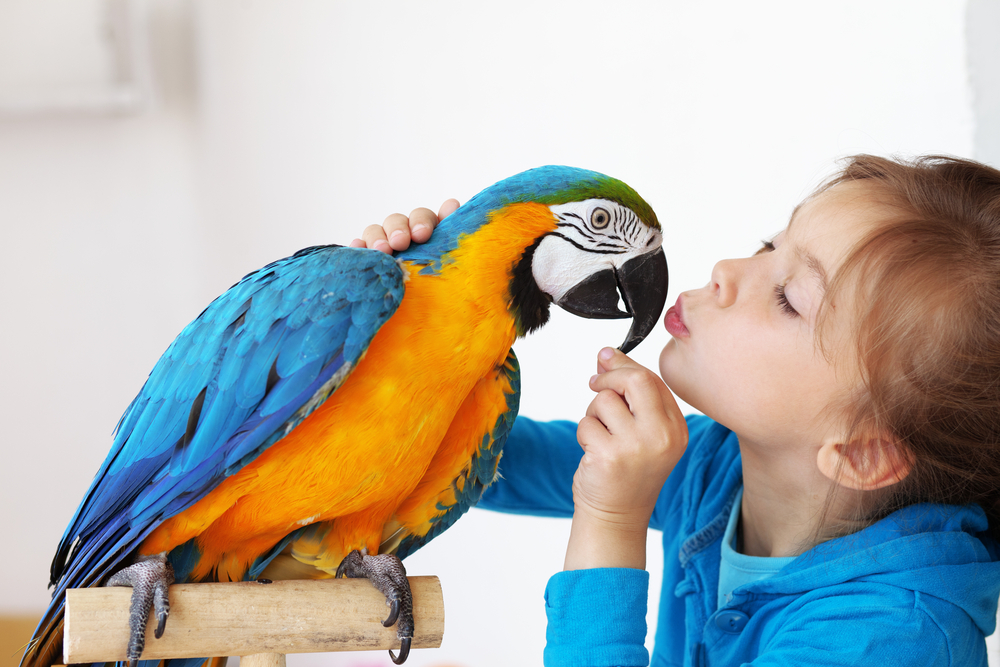
Showing Affection to Your Pet Bird: Kissing Etiquette and Safety Guidelines
Pet birds often captivate us with their friendly and endearing nature, leading us to develop strong fondness for them. Just like cat owners who dream of showering their feline companions with affectionate licks, it’s natural for bird owners to desire to express their love by giving their feathered friends a gentle kiss.
So, is it safe to kiss your bird on the top of its beak or head? Absolutely! Offering a quick peck or a gentle kiss in these areas poses no harm and can be a delightful way to demonstrate affection towards your feathered companion.
However, it’s crucial to exercise caution when it comes to kissing your bird on its mouth or inside. This is strongly discouraged due to potential health risks. Birds have a different bacterial flora in their mouths, which may include harmful microorganisms that can be transmitted to humans through direct contact. To ensure the well-being of both you and your bird, it’s best to avoid kissing on or inside the bird’s mouth altogether.
Remember, there are alternative ways to show your love and build a strong bond with your pet bird. Regular interaction, gentle petting, and providing a stimulating and enriched environment are all effective ways to foster a deep connection.
By understanding the do’s and don’ts of kissing your bird, you can prioritize their safety and well-being while still expressing your affection in other ways. Cherish the moments of shared joy and companionship with your beloved feathered friend while keeping their health and safety at the forefront of your interactions.
Kissing Your Pet Bird: Understanding the Risks and Potential Health Dangers
It’s understandable to think that it’s safe to kiss your bird if you practice proper hygiene and ensure your mouth is clean. However, the truth is that no matter how meticulous you both are about cleanliness, it is still not advisable to have direct contact between your mouth and your bird’s.
When you kiss your bird, you unintentionally transfer substances such as saliva or remnants of lip products onto them. Human saliva contains thousands of different bacteria that birds do not possess. When these bacteria enter a bird’s delicate mouth, their immune system is ill-equipped to combat them effectively.
Lip products like lipstick or lip balms often contain chemicals that are harmful to birds. Ingesting even small amounts of these substances can make your bird extremely ill, and in severe cases, it can result in their untimely demise. Moreover, it’s essential to consider your own well-being as well. A bird biting your lip can lead to serious consequences, including the potential transmission of Psittacosis, a bacterial infection that can affect humans.
To prioritize the health and safety of both you and your bird, it is best to avoid kissing them on or near the mouth. Instead, focus on alternative methods of showing affection, such as gentle petting, talking to them in soothing tones, and providing a nurturing environment.
By understanding the risks associated with kissing your bird and opting for safer forms of interaction, you can ensure the well-being of your beloved feathered friend and yourself. Let your bond with your bird flourish through responsible and mindful expressions of love and care.
Psittacosis: Understanding the Risks and Taking Precautions
Psittacosis is a potentially serious disease that can affect both humans and birds. It manifests as a flu-like illness, often accompanied by fever, cough, and fatigue. There is a significant risk that your bird may carry this disease or have been recently exposed to it.
It’s crucial to be aware of the potential dangers associated with Psittacosis and take necessary precautions. Avoiding behaviors such as kissing your bird on or near the mouth is an important step in minimizing the risk of transmission. By refraining from these actions, you can protect both yourself and your feathered companion from potential illness or harm.
Remember, there are numerous other ways to show affection towards your bird without compromising their health or your own. Engage in activities such as gentle petting, spending quality time together, and creating a nurturing environment that promotes their well-being. By focusing on these safe and loving interactions, you can foster a strong bond while safeguarding the health of everyone involved.
Prioritize the welfare of your bird and be mindful of the potential risks associated with certain behaviors. By taking these precautions, you can enjoy a fulfilling and joyful relationship with your cherished pet while maintaining the safety and health of both yourself and your feathered friend.
